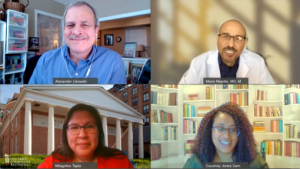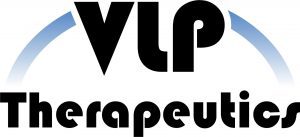
Pfizer Partners with Morgan State, Launches DrPH Vaccines Fellow Program
A Pfizer-backed Doctor of Public Health Fellowship at Morgan State University officially kicked off, bolstering the college’s commitment to life sciences and equitable health care.
On Aug. 30 the two members of the first cohort, Nguhemen Tingir and Monica Ochapa, took their first steps on this new path as Morgan State’s inaugural Vaccines Fellows. For the next two years, the pre-doctoral candidates will dive into the program and the world of vaccines. They will be expected to contribute to and take the lead in medical, clinical, and scientific affairs related to vaccines.
Throughout the two-year program, the Fellows will partner with thought leaders, medical professionals, and patient advocacy groups in order to gain a better understanding and insights into areas of unmet medical need for patients. Tingir and Ochapa will also learn to understand and interpret clinical data and align internal stakeholders on a balanced benefit-risk proposition.
Ronika Alexander-Parrish, a clinical scientist at Pfizer and founder director of the Doctor of Public Health Fellowship in Vaccines Medical Development, said the partnership between Morgan State and the pharma giant is the “seminal public health fellowship within the Pfizer Biopharma organization.”
The program’s impetus began several years ago as leadership in Pfizer’s departments increased their focus on the needs of diversity, equity, and inclusiveness within the company, as well as across the broader life sciences industry. In an interview, Alexander-Parrish pointed to a “change in climate” at Pfizer when Albert Bourla took over the reins as Chief Executive Officer in 2019 and placed importance on equity in health care and the workplace. The year after Bourla stepped into the top spot at the pharma giant proved to be a watershed moment for DE&I. The outbreak of the COVID-19 pandemic as well as societal unrest following the deaths of Freddie Gray in Baltimore and George Floyd in Minnesota shone a spotlight on a greater need for equity. Alexander-Parrish said there was an “additional call at Pfizer to include the voices of the people.” It created new opportunities to explore equitable solutions.

“There were very candid conversations about race,” she recalled.
Those conversations lead to Alexander-Parrish pitching the program at Morgan State, where she is currently studying for a Master’s degree. She presented her idea about the Doctor of Public Health Fellowship in Vaccines Medical Development and stressed the importance of vaccine development and widespread use within the community, as well as the company’s commitment to marginalized voices.
“The leadership was supportive and allowed this to move forward,” she said. “This is a new way of approaching medicines development, a partnership with public health.”
Placing the fellowship at Morgan State was an easy choice. Alexander-Parrish noted that Morgan State, one of four Historical Black Colleges and Universities (HBCUs)s in Maryland, has a history and philosophy of serving the underserved in health disparities, which is also in line with Pfizer’s commitment to equity.
“There are fewer than five HBCUs with DrPH programs in the United States. As such, we recognize and appreciate the unique value this fellowship brings to both Pfizer and Morgan,” she said.
Tingir, one of the two first Fellows in the program, said it’s of “tremendous importance” that companies such as Pfizer work with HBCUs and “foster greater diversity among BIPOC talent.” She said it provides an opportunity to create an even playing field for future life sciences employees and “create a more equitable society for the future.”

Ochapa, the other member of the first cohort, agreed. In a statement, she said the fellowship will offer her a chance to “advance solutions for health inequity, increase healthcare for underserved populations, and create innovative approaches to disease prevention through public health research and practice.”
When Tingir and Ochapa complete their Fellowship program, the duo will have an opportunity to bring their experience and viewpoint into the Pfizer organization. Alexander-Parrish said the two will be significant candidates for recruitment once they complete the program.
“There’s a perception of who biopharma is. This is an opportunity to bridge the gap between public health and biopharma. This makes sure that every voice is at the table, responsible for designing the menu,” she said. “That will bring us to a space where we’re able to change the narrative and tell everyone’s story… so we can fulfill our mission to make sure our vaccines change the lives of patients. Our goal is to make sure that everyone is there.”





